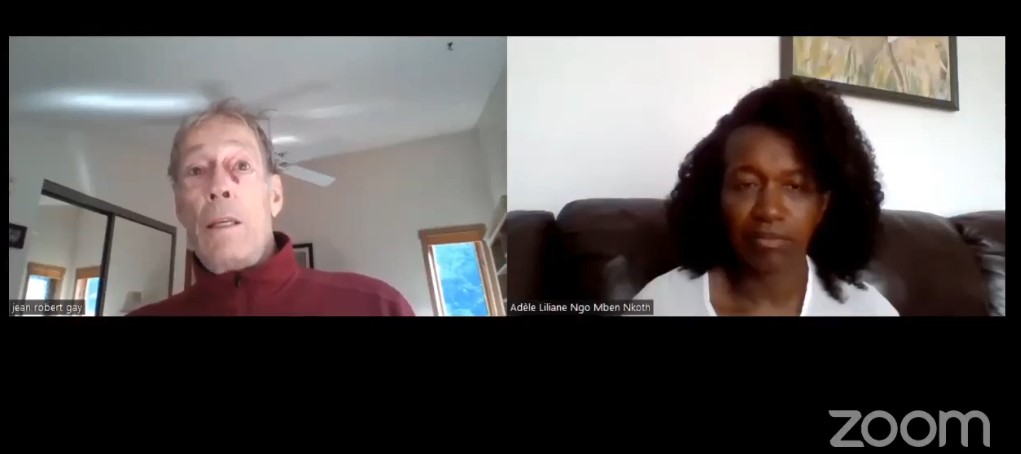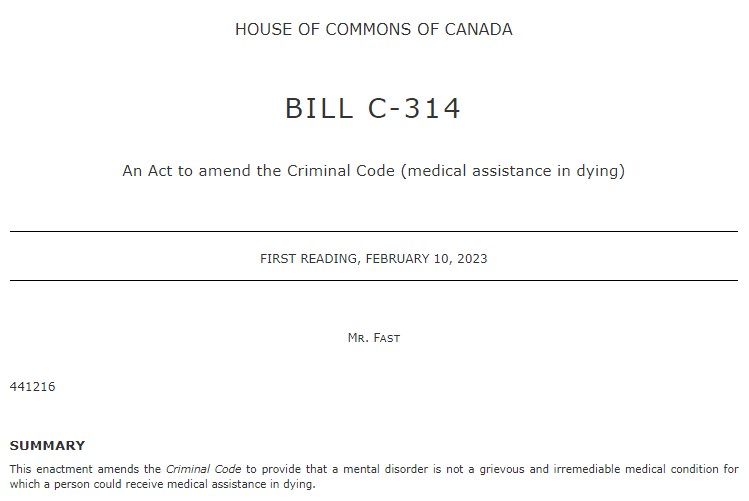In this week’s communication, we have a recap of an informative webinar by MEMO-Qc (Moelle épinière et motricité Québec / representing nearly 4,000 Quebecers paralyzed by spinal cord) and a call to rally ahead of the return of Bill C-314 to the House of Commons, in anticipation that a mental disorder is not recognized as a “serious and irremediable health problem for which medical assistance in dying may be provided.” An ANGUS-REID survey also addresses this controversial expansion of access to medical assistance in dying (desired by only a minority of Canadians and Quebecers). Please see our weekly press review for more information.
Pleasant reading,
Jasmin Lemieux-Lefebvre
Coordinator
Living with Dignity citizen network
People with disabilities: Does the lack of care and services lead to medical assistance in dying?

On September 27th, Moelleépinière et motricité Québec (MEMO-Qc) hosted a webinar as part of the Quebec Spinal Cord Injury Days. This discussion is available on the organization’s Facebook page (in French)
https://www.facebook.com/MEMOQuebec/videos/3610077749312112
Here are some highlights that we shared on our social media platforms (X/Twitter, Facebook, LinkedIn):
14:55 Official start
25:13 Testimony from Mr. Jean Robert Gay, a pharmacist for 25 years, paraplegic for 50 years. He now remains bedridden almost all day due to stenosis, has had pressure sores for 5 years, and cancer. The waiting list for the prescribed caudal injections to treat the pain is two years long (!) in the Outaouais region, not to mention a lack of services to adequately treat his wounds. He is now considering medical assistance in dying. Mr. Gay should have access to the necessary care to live, and we hope his situation will change soon.
45:36 Liberal MNA Elisabeth Prass mentions that she would have liked to add an amendment to Bill 11 that would have prohibited offering medical assistance in dying as an option for a person with a disability. For her, this situation should have been considered a crime “because it is offering death when there are other options”.
52:06 According to Québec Solidaire MNA Vincent Marissal, “if we are sending people to their death because we don’t have services… we are betraying our commitment.” He adds that in Quebec, it is prohibited to offer medical assistance in dying as an option, but only to answer questions. We confirm to him that unfortunately, many healthcare professionals currently working in the health sector, do not interpret it that way. An important reminder needs to be made on this issue.
1:04:40 Professor Pier-Luc Turcotte supports Mr. Marissal’s call to document problematic cases and revisits amendments that should have been included in Bill 11. 1:12:28 Professor Patrick Fougeyrollas tells the story of a person in intensive care who was asked if they wanted to live and calls for a moratorium on the implementation of medical assistance in dying for physical disabilities and a general assembly on access to services. Mr. Fougeyrollas was able to stay until the end of the webinar, and all his comments and feedback are worth your attention.
We hope that Minister Sonia Bélanger and her team, who unfortunately declined MEMO-Qc’s invitation, will have the opportunity to watch this webinar and take concrete actions to address the numerous issues raised during the event.
Press Review (in French and English)
A Bill to prevent MAiD from being accessible to individuals suffering from mental illness

Bill C-314 will be debated again in the House of Commons on Thursday, October 5th, 2023. Presented by Conservative MP Ed Fast, this is a non-partisan issue that transcends party lines. If it is not adopted, Canadians whose mental disorder is the sole medical issue will be able to access medical assistance in dying as of March 17th next year, if they meet the other criteria of the law. To encourage you to invite your Federal MP to support Bill C-314 (link to find their contact information), we are sharing some ideas put forth by Dr. K. Sonu Gaind, one of the most prominent voices in the country opposing this expansion (including a summary of his remarks):
1. Regarding claims that “only a few people” will be impacted are a false reassurance: In reality, Canada has fewer safeguards than the Benelux countries (in those countries, the person needs to be at a point of treatment futility; Canadian law allows people to get MAiD even when other standard treatment options are available, or have not been tried).
2. Regarding claims that the decision to allow MAiD for mental illness has gone through a robust process – this again is simply not true. The sunset clause was introduced in the House of Commons as an amendment on February 23, 2021, in response to the (unelected) Senate recommendation. On March 17, 2021, after a single evening of debate (3 hours), the amendment mandating that MAiD for mental illness would be provided was passed. That is not robust process.
3. Any objective assessment shows that current Government policy regarding MAiD for mental illness has been increasingly driven by a small number of advocates for expansion, and that safeguards have not been implemented.
4. No case of mental illness was ruled upon in either Carter v Canada, nor in Truchon (in fact, specific mention is made to point out that mental illness was not present in those cases). The Supreme Court allowed a path for MAiD in certain circumstances, it did not mandate or require MAiD for sole mental illness.
5. Regarding claims that poverty will not fuel MAiD requests for mental illness: It is well documented that some people are already receiving MAiD after being driven by social suffering, poverty, housing insecurity etc. Some bioethicists favouring MAiD expansion have even argued that it is “ok” to provide MAiD for social suffering, strongly asserting that is “harm reduction”.
6. Marginalized Canadians with mental illness, who could get better, will instead be provided with MAiD during periods of illness fueled by despair and social suffering.
7. This is not (or should not be) a partisan issue – the cautions about providing MAiD for mental illness are not about politics or ideology, but unfortunately in this polarized debate these cautions have been dismissed as “just being the other side”. Nothing could be further from the truth. Such claims wrongly dismiss legitimate concerns in this complex debate.
To further delve into Dr. Gaind’s insights, we recommend watching the John McKenzie Lecture in Medical Ethics and Professionalism at the University of Manitoba, in which he participated:
https://umanitoba.yuja.com/V/Video?v=847548&node=4129787&a=22215896&autoplay=1
as well as his webpage dedicated to his numerous interventions and efforts on medical assistance in dying: http://www.drsonugaind.com/maid.
OCT
2023
